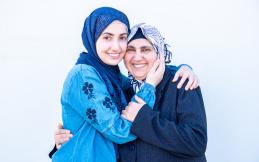
North American Muslims and their institutions have long been targets of Islamophobia. As wars and terrorist attacks become a norm, backlash and hate have become expected.
Muslim individuals, families, Masjids, schools, and organizations need to be prepared to beef up security. Visible Muslims, especially in women in Hijab, are at greatest risk.
Given these extraordinary circumstances, we are offering these updated safety tips. We first issued them immediately after the 9/11 attacks. However, we have enhanced them based on our current circumstances. Please share widely. May Allah protect all from harm regardless of their religious, racial, or ethnic background.
Your phone can save your life
- Call 9/11 if you are in danger at any point, while walking, in the car, or anywhere else. With smartphones or camera phones in almost everyone’s hands, these handy devices can save lives, including yours.
- Filming an attack as it happens and taking a photo of a license plate of a car trying to hit you are just two ways a perpetrator may back off. It will also provide evidence needed to put these hate-filled criminals behind bars if necessary.
- Consider purchasing a phone with just call and text options for every family member, especially kids in school.
- Make a habit of charging phones the night before and never leaving home without them in the mornings.
- Download apps that help family members keep tabs on each other’s whereabouts, like Life360. Other apps you can download include those aimed at women’s safety, students, and those that help you watch your back.
When walking or traveling alone
- Always be aware of your surroundings. This applies whether you are traveling alone or in groups. Don’t just focus inwardly on your thoughts if you are alone, or your friends if you are together. Keep one eye out for your environment, looking out for suspicious characters, possible danger, etc. Also, don’t assume that because your area has been "safe" thus far, that it will continue to be so.
- Travel in groups. "There is safety in numbers" is not just a cliche. It’s true. Make a point of traveling together with family members headed the same way, friends, or classmates, whether it’s on public transportation, on campus, in cars, etc.
- Change the route you normally travel by. If you’ve taken the same bus, train, or highway to get to work or school, change your route. Even if it takes you a little longer, your safety is more important. By changing your route, you can avert possible attacks or harassment from those who know your schedule, method, and route of travel well. Please note though that you should avoid short cuts that take you through unfamiliar or unsafe areas.
- Look confident. Walk with a straight posture and your arms swinging by your sides. Avoid slouching or walking like a victim. This makes you an easy target for attackers.
- Unplug your headphones while outside. If you’re used to listening to Quran, lectures, or music while outside, drop this habit. With your headphones or earbuds on, you cannot hear the approach of a possible attacker.
- Note "safe houses" along your route. Mentally note houses at intervals on each route you take that can be used as "safe houses" if you are attacked, such as shops or houses that you know to be occupied by a friend or acquaintance.
- Make your way toward a crowd if you feel you are in danger. Do not try to find a secluded place (e.g. restroom).
- If you are physically attacked, yell, shout and draw attention, do not allow the attacker to take you from that location or place you in a vehicle.
- If you are verbally attacked, keep calm and walk away towards a crowded space, inform security of the situation.
- Keep your children close if you are with your family. Do not let them roam around a playground, park, or store without you seeing exactly where they are.
In the car
- If you are driving on a highway and someone is attempting to cause an accident, keep calm. They are likely trying to frighten you so you will cause an accident and they can drive away. Ask someone in the passenger seat to video record the person, capture his/her face, car’s model and color, as well as the license plate. Report it to the police right away. Authorities will not take action unless you have been assaulted. Note down the name and badge number of the officer. Also report it to CAIR.
- Do not park your car on the shoulder when dealing with someone trying to run you off the road. That person may have a gun and if you park, and you will not be able to make a quick getaway.
- Stay calm and drive to your nearest police station if you fear you are being followed by a vehicle. Do not stop your car and if you do, make sure there is an exit and you won’t be blocked in
- Keep windows up and doors locked even when driving to avoid unwanted passengers at intersections.
- When you park your car at any location carry your keys in hand if anyone harasses you draw attention by pushing the alarm button on your security system.
- Also have your keys ready, so that you can quickly get into your car.
- But don’t just get in right away. Always check your car before entering, especially the back, for any intruders.
- Never leave your car door unlocked. Even if it means for one minute, keep all doors locked. Attackers have been known to lie in wait for such an opportunity.
- Avoid parking in areas that are not well lit. Where possible, park close to a school, a work entrance, or in a parking garage that has an attendant.
- Be careful in parking lots. Always be alert in parking lots, especially when it's dark. Ask someone to escort you to your car. Between cars and inside cars, it's easy for someone to hide and wait until an unsuspecting person comes along.
- If you park your car at a university garage, ask security to escort you to and from your car.
- If you see a suspicious person approaching or hanging around near your parked car, turn around and go back to an area where there are other people. Try to get an escort to your car through the campus or job security or local police.
When traveling by public transportation (bus or train)
- Do not choose the window seat as you may be "blocked in" by a potential assailant. Always select the seat next to the aisle so that you can quickly leave if necessary.
- Sit as close to the driver or conductor as possible if you are taking public
transportation alone after peak hours. If you cannot, choose the section of the bus/train that is most crowded. Try to get a seat near the exit as well.
When traveling by taxi
- Avoid flagging taxis. Always order taxis so the driver can be traced if something happens.
- Always check the identification of the driver (usually located near the visor) and ensure that it matches the driver.
- Don't sit behind the driver once inside, as it may be easy for the driver to lock the rear passenger door. Always choose the adjacent seat.
Other tips
- If you make a call from a phone booth. After dialing the number you wish to call, always turn around so that you have your back to the phone and may see who or what is coming your way. You will then be able to tell the person to whom you are speaking that you may be in trouble and you may be able to use the weight of the phone as a weapon. The door of a telephone box could be used to wedge in the limbs of the attacker.
- Do not open the door of your home without checking. DO NOT open the door to your home without first checking from a window, peephole, or by asking and verifying who it is. Instruct children to do the same.
- Report any suspicious activity around your home. If you see people loitering on the streets near your house, call the police on a non-emergency number and report it.
- Tell others about your whereabouts. Parents, spouses, and friends should know where you are going and when you will be back, so that your absence will be noticed. Arrange a call-in system with a friend if you live alone, whereby you call when you arrive home. Or use the above-mentioned apps in the phone section.
- Trust your instincts. If you are walking or driving somewhere and feel strange or scared, don’t ignore this feeling. Take extra precautions by walking a little faster to get to a more populated or well-lit area, or change the route you’ve been driving on.
- If you are walking alone in an unsafe area, call someone and ask them to stay on the line with you until you get to a safer area.
- If you are the first to get home to an empty house, be on the phone when you enter, just to make sure no one has broken in and may attack once you come through the door.
- NEVER admit that you are alone if someone calls your home and asks if you are
alone. Ask who the caller is. If they refuse to identify themselves, calmly hang up. Instruct children to do the same when they pick up the phone. Keep the radio on in the house so that callers will get the impression that others are in the home too. - If you receive an obscene or crank call, do not talk to the caller. Hang up if the caller doesn’t say anything, or as soon as s/he shouts obscenities. Hang up the phone calmly and do not slam it down. Note down the date and time of the calls. If they are persistent, inform local police.
- If you are a student, avoid studying in isolated classrooms in parts of the college campus that are not regularly patrolled by the school’s security officers.
- In large buildings take the elevator, not the stairwell. Stairwells are usually quiet and dark. Most people take the elevator. But if someone creepy gets on, don’t hesitate to get off at the same time. Or, if someone is already on the elevator who you feel strange about, do not get on and wait for the next elevator.
- Don’t forget Dua:
- When leaving the house: Bismillaahi, tawakkaltu 'alallaahi, wa laa hawla wa laa quwwata ‘ illaa billaah. Translation: In the Name of God, I have placed my trust in God, there is no might and no power except by God.
- When getting into the car or boarding public transportation: Subhana allathee sakhkhara lana hatha wama kunna lahu muqrineena. Wainna ila rabbina lamunqaliboon. Translation: Glory be to Him Who made this subservient to us and we were not able to do it. And surely to our Lord we must return.
- Report any and every incident
This is key to fighting bigotry of any kind. Reporting it will not only keep you safe. It will keep the wider community safe as well. Report it to:
1. Local police
2. CAIR
© Sound Vision Foundation
Note: Please share this article using our share buttons below. However, for permission to distribute electronically or in print, please send an email to Copyrights@SoundVision.com. Thank you.









Add new comment